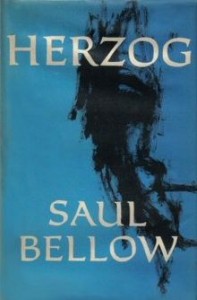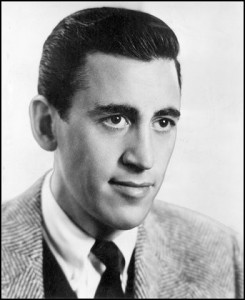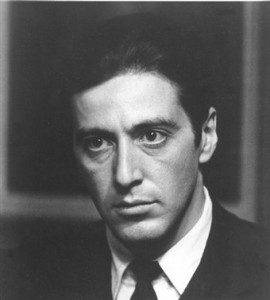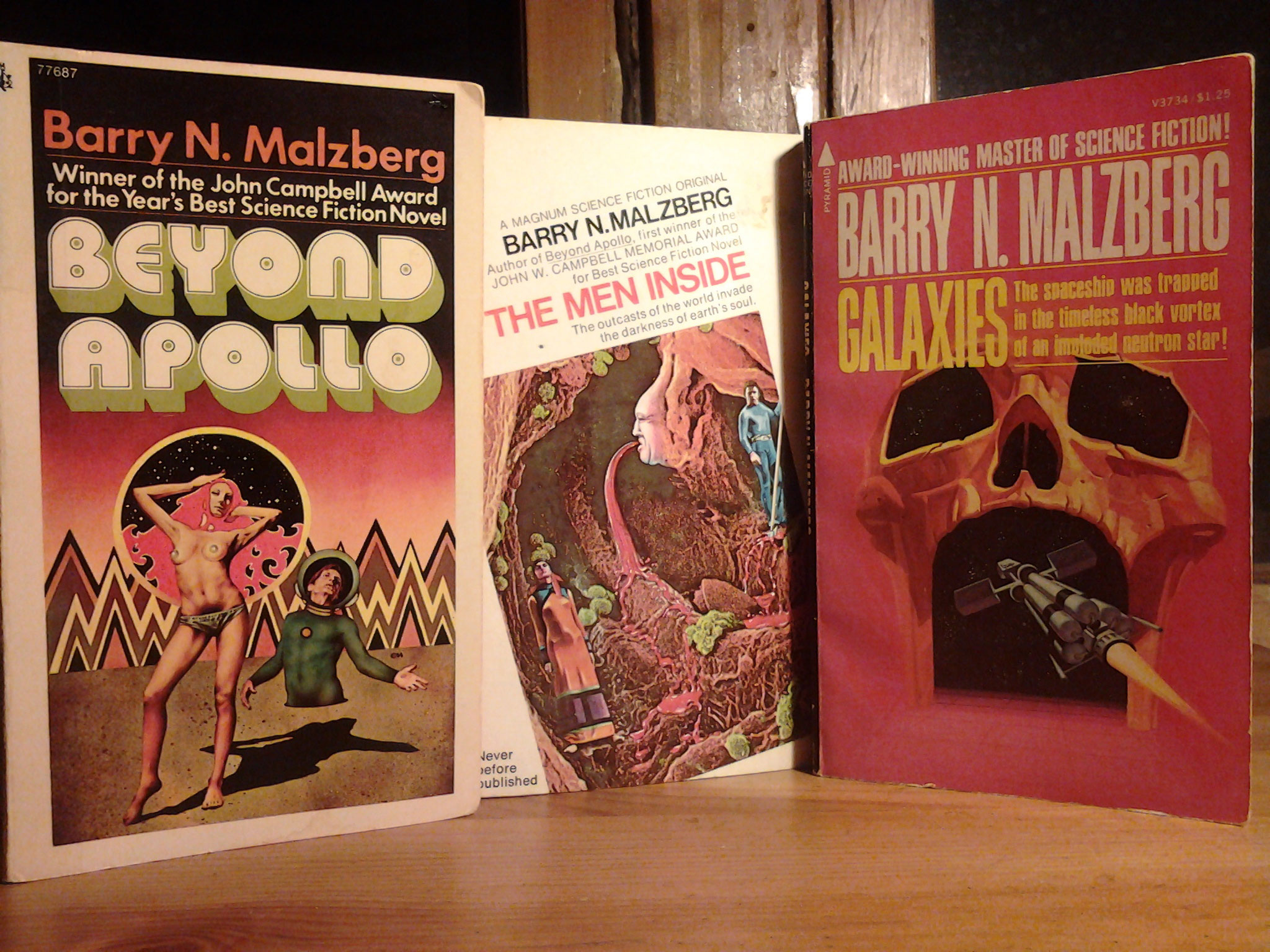Onward with a Grin: A Scene from Herzog by Saul Bellow
 Herzog
Herzog
by Saul Bellow
Originally published by Viking Press, 1964
Buy from Amazon
In the lecture he delivered on the first day of classes at Wellesley College and Cornell University, Vladimir Nabokov tells of a Russian poet who was executed in 1921 because he would not stop smiling. Nikolai Gumilev died on an unknown day in August and, although his Soviet executioners did not know it, the crime for which he was first arrested was most certainly fabricated by their higher-ups. Still, Nabokov says, what truly irked “Lenin’s ruffians” was Gumilev’s steadfast smile, which he held even against the shock of the firing squad.
There is a cheerful morbidity in this anecdote that’s mixed from unpleasant truth, dark absurdity, and the inexorably joyous countenance of a man knowing he must die. There’s also a fundamental comedy of desperation on behalf of the Soviet goons who, at some point during the interrogations, must have flung up their arms up and said that if this poet won’t quit grinning then he has to go, so Gumilev unmindfully did.
This sort of comedy—with its helplessness, muddled terror, and insistent smile—is intertwined with the tragic in Saul Bellow’s fiction. Bellow intermingles sadness with laughter to create desperate comedies of hurt and self-humiliation, which attempt at first to allay pain through punchlines, by turning sorrow into farce. In art, the comic is usually superficial. Laughter is assigned the role of cure-all healer, a wheeler-and-dealer with the snake oil of stock gags and slapstick, where jokes are told to lighten the mood and reduce the gloom; yet Bellow pierces deeper.
For Bellow, laughter is not superficial, nor is it sorrow’s antithesis; for Bellow, laughter is the inherent human response to the incomprehensibility of life and all the flummoxing troubles therein. Comedy, then, becomes the involuntary sidekick that guides Bellow’s heroes who struggle closer to the crux of life’s inadequacies with vigor and a grin. The desperate comedy in Saul Bellow’s fiction forces the tragedy deeper by making it a little more palatable and accurate.
There’s a silly scene from Herzog that’s stuck in my mind for many years. It involves CPR and a monkey. Deep in the novel, Moses Herzog returns to Chicago to visit his young daughter who lives with his ex-wife. Before Herzog meets his daughter, he spends the night with an old friend, Luke Asphalter, a bachelor-zoologist who studies monkeys, and recently Herzog read in a magazine that when one of Asphalter’s subjects died he tried to revive it. “You must have been out of your mind, giving Rocco mouth-to-mouth respiration,” Herzog says. “That’s letting eccentricity go too far.” Asphalter says no one else’s death could have unraveled him the way Rocco’s did.
“You don’t mind if I smile,” Herzog apologized. “I can’t help it.”
“What else can you do?” Asphalter asks.
Is it mad to cherish an animal above all else? Is it insane that Asphalter says, “I was glad I had no wife or kids to hide these crying jags from,” because after Rocco died, he underwent a depression, quit showing at work, and let his beard grow so he’d better resembled the deceased simian? To Herzog it’s funny, devastating but funny, at least, he says, as “these painful emotional comedies” go.
It’s difficult to qualify the comedy in this scene—how it works, what to call it, what sort of reaction it requires; there are not one-word answers. There’s an element of black humor but it’s surpassed by Asphalter’s love and an element of absurdity that corrodes under the tears. There’s physical comedy in the memory of Asphalter attempting to resuscitate Rocco, though it seems less funny once Asphalter admits how much he needed the creature. The cartoon entertainment of a man giving CPR to a monkey mixes with the seriousness of loss. There’s death, loneliness, solitude, cordiality, and Moses Herzog’s continual bafflement as he tries to understand and fails. Asphalter says he’s been experimenting with different psychoanalytic treatments in an attempt to defeat his grief, but nothing helps. “Perhaps he was about to cry. I hope he won’t, thought Herzog. His heart went out to him,” Bellow writes. Then, as Asphalter describes how for one grief therapy session he pretended that he himself was dead—to overcome the sorrow of death by overcoming his own—Herzog thinks about Heidegger’s views and how “human life is far subtler than any of its models, even these ingenious German models. Do we need to study theories of fear and anguish?” This adds a tinge of humorous humility. The grand thinkers, as masterful as they may be, have no words to assuage the awfulness of the death of Rocco the monkey.
“You don’t mind if I smile?” “What else can you do?”
This exchange has guiding force. It’s the force of a smile that protrudes through, a smile mixed a startled, helpless laugh. The scene encapsulates the necessity of laughter, the deep soul-grunt of relief that laughter offers. Pain, loneliness, loss—these casual horrors are held at bay by the rebellious power of Herzog’s chuckle and grin. Laughter can stand up to misery and darkness; laughter is often an act of defiance. Shockingly, the worst of life can be shrugged off with a silly grin. “What else can you do?” These words have echoed in my mind for a long time. It’s a simple exchange, the kind that you could overhear on a bus or have with a friend about something very trivial or serious. Don’t mind if I smile? What else can you do? The facial expression that goes with “What else can you do?” is so particularly human it’s stunning.
Nabokov once described the Chekhovian hero as “a good man who cannot make good,” someone who “stumbles because he is staring at the stars.” One cold night in Chicago a while ago, Moses Herzog crashed on his friend’s couch. And there they were, two injured men laughing, two men who did their best but since when has that ever been good enough? The stars burn with infinite indifference to the plight of dreamers. The stars are beautiful but they cannot guide us.
“Unexpected intrusions of beauty. This is what life is,” Herzog thinks later, while he fills a sink with water and notices the “gray light” of the bathroom and the “almost homogenous whiteness” of the oval basin. The same holds for humor. Unexpected intrusions of laughter, of smiles, are what life is. They make the daily struggle slightly more bearable, knowing that at some point a chuckle, hearty haha, or quiet smile will arrive. Laughter is the necessary response to inexplicable loss and inevitable decay, a required reaction to all the regular and extravagant hurts that mark our days. What else can you do? Out of nowhere sometimes, like a ferocious roar, laughter will burst forth to remind us we are so fiercely, foolishly alive.
***
Alex Kalamaroff is a 26-year-old writer living in Boston. He works on the administrative team of a Boston Public Schools high school. You can read his other writings here or follow him on twitter @alexkalamaroff.
February 10th, 2014 / 10:00 am
25 Points: 3 Novels by Barry N. Malzberg (Beyond Apollo, The Men Inside, & Galaxies)
Beyond Apollo | 1972, Random House | 156 pages
The Men Inside | 1973, Prestige Books | 175 pages
Galaxies | 1975, Pyramid Books | 128 pages
(Note: all three of these books are out of print, but cheap used copies can be found. In Chicago, I bought Beyond Apollo for $2.95 at Myopic Books (in Wicker Park) and The Men Inside for $3 at Bucket O’ Blood Books and Records (Logan Square). Galaxies I purchased used through Amazon for $1.25 + s/h.)
1. On 15 August 2011, my pal Jeremy M. Davies emailed me and said that I should look for a book called Galaxies by Barry N. Malzberg because it was “seriously beyond belief.”
I’m ashamed to say it took me until earlier this year to pick up a copy and read it. However, once I got started, I finished it under 24 hours.
2. Barry N. Malzberg was born in 1939. Since 1968, he’s written at least 66 books, if not more. (He’s worked under ten different names that I know of, which complicates compiling a full list.) Dozens of them are science-fiction novels—at least in theory. He’s also written story collections, essay collections, movie novelizations, crime novels, and pornography.
3. Galaxies (1975) at first glance tells the story of a young astronaut, Lena Thomas, the sole crew member of the spaceship Skipstone. Her cargo is an immense tank of goo filled with 515 human corpses. It’s the year 3902 and a person can pay to have his/her body ferried into space after death in the hopes that cosmic radiation will revive them.
Midway through the voyage, the Skipstone falls into a black hole, and the majority of the novel’s plot deals with Lena’s attempt to escape the ensuing hallucinatory free fall. During that timeless time she repeatedly dies and is reborn, recalls her lover John, consults with cyborg engineers, and communes with the dead, who have psychically reawakened.
But that’s not really what Galaxies is about.
4. Rather, Galaxies is a work of metafiction, concerned with its own creation, and presented as Malzberg’s notes on how he would write the novel Galaxies, if only he could. (He maintains that the novel is impossible to complete with present knowledge.) As such, most scenes are outlined rather than dramatically depicted. For instance, Chapter 29 begins:
And here could run yet another moody flashback concerning Lena’s relationship with John, dropped in to provide color and poignance, augmenting the mood of despair. Long sexual passages here could alternate with painful streams of consciousness in the present. Sex and space, orgasm and isolation could run counterpoint, and the author’s gifts for irony, which are not modest, would be exhibited to their fullest range. Also, in the traditions of modern science fiction, the sex scenes could be quite titillating, render the novel some extraliterary interest. A construct like this could use all the extraliterary interest it could get.
But even that’s not really what Galaxies is about.
6. Rather, Galaxies is about what science-fiction should look like in the year 1975. Malzberg is surveying contemporary literature and asking: How should science-fiction respond to the then-recent literary experiments of John Cheever, John Barth, Donald Barthelme, Joyce Carol Oates, Philip Roth, and others?
7. I’m not making this up. On page 48 Malzberg writes:
For instance, as the ship falls, there could be some elaboration on the suggestion that neutron stars might be pulsars which would be most intriguing, if the reader has not been intrigued sufficiently by the notion that all of “life” as we understand it when we glimpse the heavens may be merely an incidental by-product of the cycle of neutron stars.
So there, Cheever, Barth, Barthelme, Oates. What in the collected works would touch that for angst?
8. Malzberg calls those authors out again on page 85:
“Madness,” Lena says, shaking her head, “that’s utter madness,” but the author, busily pulling the handles of this little dumb show, sweating behind the canvas, casting a nearsighted, astigmatic eye every now and then through the cardboard of the set to see whether the audience is paying attention, how the audience is taking all of this, is thinking take that Barth, Barthelme, Roth, or Oates! Pace Bellow and Malamud, and may your Guggenheims multiply, but what have any of you or those unnamed created to compare with this?
9. If I haven’t convinced you yet to spend $2–3 on a used copy of Galaxies, you might as well quit reading now.
April 1st, 2013 / 8:01 am
Books Concerning Friendship

Alec Niedenthal spent the weekend here in NYC, and we got into a conversation about Bellow’s Ravelstein, which I recently read and loved very much. Among its other signal virtues, it is one of the best books on friendship I think I’ve ever read. This got us talking about books about friendship as a literary subject, and we decided to see how quickly we could think of a dozen books that treat it as the (or a) major theme. Here’s what we came up with, in the order we came up with it–a highly non-exhaustive, non-hierarchical list off the top of our heads. Annotations indicate which of us has read the book in question. Interestingly, the final tally was four books only he’d read, four books only I’d read, and four books we’d both read.
Ravelstein – Saul Bellow (J + A)
The Waves – Virginia Woolf (J + A)
Humboldt’s Gift – Saul Bellow (A)
Pale Fire – Vladimir Nabokov (J + A)
Try – Dennis Cooper (J)
Hey Jack! – Barry Hannah (J + A)
A Sentimental Education – Gustave Flaubert (A)
It – Stephen King (J)
Veronica – Mary Gaitskill (J)
Chilly Scenes of Winter – Ann Beattie (A)
David Copperfield – Charles Dickens (J)
Correction – Thomas Bernhard (A)
Anyone got further recommendations or thoughts about these books? You know what to do.
Literary Doppelgangers


I’ve always thought J.D. Salinger looked like the young Al Pacino in The Godfather, so much so that when reading the former, I would hear ‘HOO-AH!’ sporadically inserted throughout the text. The Glass and Corleone families are very similar; both represent brilliant families slowly falling towards their demise.
 And then there’s Leonard Cohen, circa his breathtaking Songs From A Room period. He is said to have written those songs in Hydra, a (then) primarily uninhabited Greek island without electricity.
And then there’s Leonard Cohen, circa his breathtaking Songs From A Room period. He is said to have written those songs in Hydra, a (then) primarily uninhabited Greek island without electricity.
This got me thinking about doppelgangers, which despite sounding like a kind of gang-bang, is strange since our visual notion of these men are through a stagnant set of photos. We share a collective ‘memory’ of famous people, and I thought it might be fun to talk more about folks who are doppelgangers.
—

